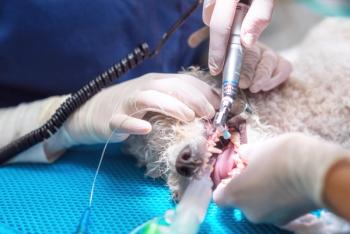
Leading Off: Don't just hunt zebras: The new preventive healthcare guidelines
Dr. Michael Moyer shows the importance of the new preventive healthcare guidelines.
In September of last year, the American Animal Hospital Association and the American Veterinary Medical Association published the first Canine and Feline Preventive Healthcare Guidelines (available at
Michael R. Moyer
ILLUSTRATIONS OF NEED
Last week, two different veterinary students—one who was the owner of one of our patients, another who was the student clinician—described their respective visits to me as "just here for a rabies shot." While each pet was, indeed, in need of rabies vaccination, we introduced the Canine and Feline Preventive Healthcare Guidelines and proceeded to go through the appointment in the context of a comprehensive health exam.
In one case, we ended up in a prolonged discussion about cat weight management (two cats in the apartment—one with a body condition score of 8/9, the other a 5/9). This discussion was exactly like the discussions you have with your clients every day in practice. While it may not, on the surface, seem as medically intriguing as successfully managing diabetic ketoacidosis, it is profoundly cat life-changing if you can negotiate fewer calories for overwieght cats (and, in particular, for the right cats in those multicat households).
And the other "just a shot" canine visit ended in a discussion about fecal parasites and urban dog parks, the need for frequent fecal parasite exams here in Philadelphia, and appropriate preventatives to consider.
So by my reckoning, my student clinicians prevented, in two appointments, diabetes in a cat and a trip to the ER for Trichuris-induced hematochezia. If not absolutely, then at least hypothetically.
WHAT WE LEARN VS. WHAT WE SEE
We train in very highly specialized veterinary hospitals, where common veterinary medical conditions are, ironically, uncommon. I don't know if an aural hematoma has ever been seen on soft tissue surgery service—I know I've never heard of one. Or simple anal sacculitis. One of my classmates called me about a month after we graduated to share war stories and asked me if I, too, had missed the lecture on emptying anal sacs, since it was something every other dog owner requested in general practice, but something we never heard about or saw in school.
We learn how to manage intense medical and surgical cases, we learn to formulate a wide range of rule-outs, and we learn to hunt zebras. And when a patient comes in with big problems, it is a little easier to frame the diagnostic and therapeutic plans—it's obvious to everyone that a fractured femur needs attention.
But it isn't always obvious to owners, even when the owner is a veterinary student, that the pet's lifestyle, type of housing, environment, activity level, and diet and method of feeding must all be considered and integrated into a plan for the care of that pet by the veterinary team.
A VITAL CONVERSATION
This is what we're trying to get to in the guidelines, to emphasize the comprehensive nature of preventive veterinary medicine—something that so many veterinarians perform superbly. But many may fall short in their ability to communicate just how comprehensive a visit the "yearly exam" is. It isn't "just a shot" or "just a physical exam." At its best, the wellness or preventive care visit provides the opportunity for a vital conversation between the veterinary team and the owner to provide the optimum care for the pet for its future, with a plan to revisit the plan on a regular basis.
By using the familiar SOAP (subjective, objective, assessment, and plan) approach, the framework for the preventive care visits fits with our more traditional problem-oriented cases. And instead of treating today's problem, we are preventing tomorrow's.
Michael R. Moyer, VMD, is the Rosenthal Director of Shelter Animal Medicine and an adjunct associate professor at the University of Pennsylvania's School of Veterinary Medicine. He is also president of the American Animal Hospital Association and a member of the AAHA-AVMA Preventive Healthcare Guidelines Task Force.
Newsletter
From exam room tips to practice management insights, get trusted veterinary news delivered straight to your inbox—subscribe to dvm360.





